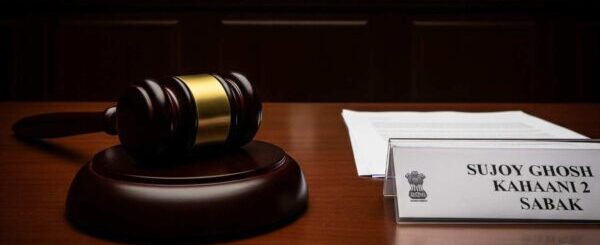The Supreme Court has agreed to hear filmmaker Sujoy Ghosh’s petition challenging criminal proceedings over alleged copyright infringement concerning the film “Kahaani 2” and the literary work “Sabak.” Read the detailed legal analysis of this high-profile copyright dispute.
Introduction
The Supreme Court of India has recently taken cognizance of a high-profile copyright infringement dispute involving celebrated filmmaker Sujoy Ghosh. The apex court has agreed to entertain a petition filed by Ghosh, who faces criminal proceedings alleging that his film Kahaani 2 unlawfully appropriated content from a literary work titled Sabak. This development marks a significant judicial intervention in the intersection of creative expression and intellectual property rights within the Indian film industry.
Background of the Dispute
The controversy originated when the author of Sabak, a literary work, accused Sujoy Ghosh of copying substantial portions of their original narrative in the making of Kahaani 2. According to the complainant, Kahaani 2 replicates the plot, characters, and thematic elements from Sabak without authorization or licensing, amounting to a violation of the author’s copyright.
Subsequently, criminal proceedings were initiated against Ghosh under the provisions of the Copyright Act, 1957, which criminalizes acts of copyright infringement involving copying, distribution, or public display without consent. The filing of a criminal complaint in such cases is not common and signals the seriousness with which the claimant perceives the alleged infringement.
Legal Framework and Issues Involved
The central legal question revolves around whether the film Kahaani 2 constitutes a substantial reproduction of the original literary work Sabak, such that it infringes upon the copyright vested in the author of Sabak. Indian copyright law, as codified in the Copyright Act, safeguards the original expression of ideas embodied in literary, dramatic, musical, and artistic works. However, copyright does not extend to ideas, themes, or concepts themselves but rather to the unique manner in which these ideas are expressed.
The issues before the court include:
- Substantial Similarity: Whether Kahaani 2 bears a substantial similarity to Sabak beyond general thematic or conceptual overlap.
- Originality and Expression: Whether the expression of ideas in Kahaani 2 is original and distinct or directly copied from Sabak.
- Criminal Liability: Whether the allegations satisfy the stringent requirements for criminal proceedings under the Copyright Act, including intent and knowledge of infringement.
- Balance of Creative Freedom and Protection: The court must also consider the delicate balance between protecting intellectual property rights and preserving creative freedom within the film industry.
Supreme Court’s Intervention
By agreeing to hear Sujoy Ghosh’s petition, the Supreme Court will now examine the legality and propriety of the criminal proceedings launched against him. The petition challenges the initiation of criminal action at the preliminary stage without a thorough investigation or judicial scrutiny of the merits of the copyright claim.
Ghosh’s legal team argues that the allegations are unfounded and represent an attempt to stifle creative expression and artistic innovation. They contend that the film is an original work inspired by a range of sources and does not copy any specific literary work in violation of the Copyright Act.
The Supreme Court’s intervention is significant because it will address important jurisprudential questions regarding the threshold for criminal liability in copyright infringement cases, particularly in the creative domain of cinema.
Implications for the Film Industry and Intellectual Property Law
This case carries significant implications for filmmakers, producers, and writers within the Indian film industry. The outcome will likely clarify the contours of copyright protection in films and literary adaptations, offering guidelines on what constitutes infringement and the scope of permissible creative borrowing.
It also underscores the necessity for robust legal safeguards that prevent frivolous or vexatious claims aimed at impeding legitimate artistic endeavors. At the same time, it reinforces the rights of original creators to protect their intellectual property against unauthorized exploitation.
Moreover, the Supreme Court’s judgment will contribute to developing a balanced approach that respects both the sanctity of copyright and the freedom of artistic expression.
Precedents and Comparative Jurisprudence
The Supreme Court’s decision will draw upon existing precedents related to copyright infringement in cinematic works. Indian courts have, in past cases, emphasized the importance of examining both quantitative and qualitative similarities in determining infringement. The threshold for criminal prosecution is generally higher than for civil claims, requiring proof of deliberate infringement.
Comparative analysis of international copyright jurisprudence, including decisions from the United States and the United Kingdom, may also influence the Court’s reasoning, especially regarding the protection of derivative works and adaptations.
Conclusion
The Supreme Court’s agreement to hear the petition filed by Sujoy Ghosh in the Sabak vs. Kahaani 2 copyright dispute represents a critical juncture in Indian copyright law and film industry practices. The Court’s forthcoming judgment will clarify the legal parameters governing originality, substantial similarity, and criminal liability in copyright infringement cases involving creative works.
For now, the film fraternity and literary circles await a definitive ruling that balances the competing interests of intellectual property protection and creative liberty, ensuring that both creators and innovators receive fair treatment under the law.

























